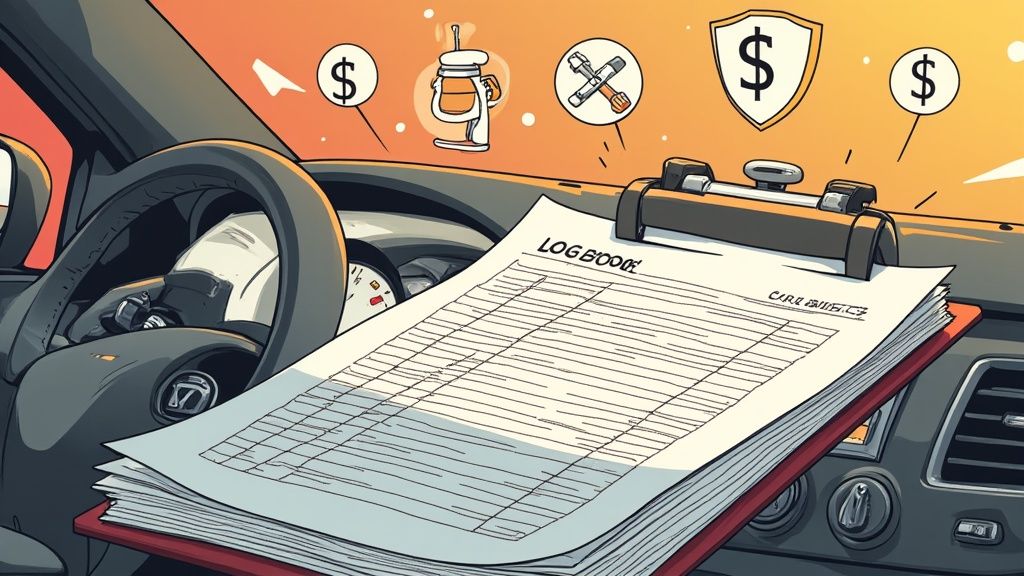
Vehicle Log Book Mastery: A Complete Guide to Protecting Your Car's Value
Why Smart Vehicle Owners Keep Detailed Records
Taking care of your vehicle requires more than routine maintenance - it needs organized documentation to protect its value. Like a passport documents your travels, a logbook chronicles your vehicle’s journey and validates its history. Proper record-keeping delivers real benefits, from optimizing fuel efficiency to securing warranty coverage and maximizing resale potential.
The Financial Perks of a Well-Kept Log Book
Fleet managers consistently see 4-5% better fuel economy just by tracking vehicle data systematically. While this may seem minor, the savings add up significantly over time, especially for high-mileage drivers and commercial fleets. Complete maintenance records have also helped many owners successfully claim thousands in warranty repairs. This is because a detailed logbook provides clear evidence of following manufacturer service schedules - a key requirement for warranty coverage.
Consider having a major engine repair denied because you can’t prove regular maintenance was performed. Thorough documentation prevents this risk and ensures you receive full warranty benefits. Beyond warranty protection, excellent records serve as a powerful asset when selling. Used car buyers place a premium on vehicles with complete service histories, as it gives them confidence in the car’s condition and care. Well-documented vehicles consistently command higher resale prices compared to similar models lacking proper records.
Beyond the Dollars: Other Benefits of Meticulous Record-Keeping
A detailed vehicle logbook does more than protect your investment - it provides valuable insights into your car’s performance and health over time. Like a medical history for your vehicle, it helps track vital statistics and catch potential issues early.
-
Fuel Consumption Analysis: Recording fuel purchases and mileage creates a clear picture of your vehicle’s efficiency patterns. This makes it easy to spot concerning changes, like sudden drops in fuel economy that could signal mechanical problems needing attention.
-
Preventive Maintenance: Organized records help you stay on schedule with oil changes, tire rotations, and other crucial services. This proactive approach prevents breakdowns and helps your vehicle last longer.
-
Warranty Compliance: A complete service history documented in your logbook satisfies manufacturer requirements for warranty coverage. It provides proof that you’ve maintained the vehicle properly.
-
Informed Decision-Making: The data in your logbook empowers smarter choices about repairs, upgrades, and eventually selling or trading in your vehicle.
While maintaining detailed records takes some effort, it delivers clear value in multiple ways. It demonstrates responsible ownership and commitment to preserving your vehicle’s condition and worth. From protecting warranties to maximizing resale value and providing diagnostic insights, a well-kept logbook is essential for any vehicle owner who wants to protect their investment.
Building Your Vehicle’s Health History

Keeping detailed records of your vehicle’s maintenance and repairs does more than fill pages in a logbook - it creates a documented history that can protect your investment and boost resale value. A well-maintained vehicle logbook provides clear evidence of responsible ownership and proper care. Let’s explore what makes an effective logbook and how to build one that serves your needs.
Essential Components of a Vehicle Logbook
A proper vehicle logbook needs to capture the full story of your car’s maintenance and care. Going beyond basic oil change records, it should document every aspect of your vehicle’s life to create a clear picture for future reference.
-
Vehicle Information: Start with the basics - record your vehicle’s make, model, year, VIN number, and other key details. This foundational information connects all your records to the specific vehicle.
-
Service Records: This forms the core of your logbook. Track every service appointment, including oil changes, tire rotations, and routine maintenance. Note the date, mileage, specific work done, and who performed the service. Keep all receipts as backup documentation.
-
Fuel Records: Monitor your vehicle’s efficiency by recording fuel purchases, including date, amount, cost, and mileage. This helps spot performance issues early, like decreased fuel economy. According to the US Department of Energy, good maintenance tracked through fuel records can improve mileage by up to 4.1%.
-
Repair History: Keep a separate section for non-routine repairs and issues. Document what broke, how it was fixed, parts used, and associated costs. Clear repair records build trust with future buyers by showing transparency.
-
Additional Details: Include any modifications, accident reports (even minor incidents), and other events affecting the vehicle’s condition or value. This thorough documentation demonstrates your attention to detail.
Organizing Your Vehicle Logbook: Systems That Work
Having good records is important, but keeping them organized and accessible is equally vital. Consider these proven approaches:
-
Physical Binder: A simple three-ring binder with labeled sections offers a tangible, easy-to-use system you can customize.
-
Digital Spreadsheet: Electronic spreadsheets make it simple to enter data, calculate statistics like fuel economy, and sort information as needed.
-
Specialized Apps: Many apps are built specifically for vehicle record keeping. Auto Service Logger offers digital tracking with features like maintenance reminders and cloud backup.
No matter which system you choose, consistency is crucial. Update your records promptly after each service or event. This habit ensures your documentation stays current and accurate. A complete vehicle logbook isn’t just paperwork - it’s proof of your commitment to maintaining your car properly. This detailed history helps you make informed decisions about maintenance and provides solid documentation when it’s time to sell. Future buyers will appreciate seeing the care you’ve invested in the vehicle through your thorough record keeping.
Mastering Fuel Economy Through Smart Tracking

A vehicle logbook does much more than just record maintenance - it’s an essential tool that helps you understand and improve your fuel consumption. By carefully monitoring fuel usage over time, you can spot opportunities to reduce costs and keep your vehicle running at its best. Here’s how smart vehicle owners and fleet managers use this valuable data to their advantage.
Calculating Real-World Fuel Efficiency
To track fuel consumption effectively, you need to look beyond the manufacturer’s MPG estimates and measure how your vehicle performs in actual driving conditions.
-
The Basic Formula: To find your real MPG, divide total miles driven by gallons of fuel used. For example, driving 300 miles on 15 gallons equals 20 MPG.
-
Consistency Is Key: Make it a habit to record both mileage and fuel quantity every time you fill up. Regular data creates an accurate picture over time.
-
Note Key Variables: Record driving conditions like weather, terrain, and traffic in your logbook. This context helps explain changes in fuel efficiency.
These consistent measurements establish a baseline that lets you track improvements and catch potential issues early.
Identifying Concerning Patterns
Once you have several weeks of fuel data, you can start spotting problematic trends. For instance, a sudden drop in MPG often signals mechanical trouble - it could mean clogged fuel injectors, a dirty air filter, or a failing oxygen sensor need attention.
Your logbook becomes even more valuable when you compare fuel records with maintenance history. You might notice fuel efficiency improves right after oil changes, showing how regular maintenance directly impacts performance. These insights help you prevent issues before they become expensive repairs.
Documenting Improvements and Savings
Your logbook proves its worth when tracking the results of changes you make. Whether you switch fuel grades, adjust driving habits, or perform maintenance, the numbers will show if these changes actually save fuel and money.
For example, if premium fuel genuinely improves your MPG, your logbook data will confirm it. The same goes for efforts to reduce idling time or drive more efficiently - you’ll see concrete evidence of what works. Having clear proof of cost savings helps reinforce good habits and justify spending on preventive maintenance.
This ability to measure results transforms your logbook from basic record-keeping into a powerful tool for ongoing improvement. By understanding your vehicle’s baseline performance, catching problems early, and measuring the impact of changes, you take control of fuel costs while extending vehicle life. This data-driven approach leads to real savings and a more efficient driving experience.
Protecting Your Warranty Like a Pro
A complete vehicle logbook is vital for protecting your car’s warranty. Having detailed maintenance records helps prove you’ve met all warranty requirements and ensures you’ll receive full coverage when needed.
Understanding Manufacturer Requirements
Every car maker has their own maintenance schedule that owners must follow to keep warranties valid. Recording all services in your logbook helps track compliance with these requirements. For instance, if your warranty requires oil changes every 5,000 miles, your logbook should note each service’s date, mileage, and oil type. This kind of detailed record-keeping makes a big difference when warranty claims come up.
Common Documentation Mistakes That Void Warranties
Poor record-keeping often leads to denied warranty claims. Many owners fail to save repair receipts, which are needed to prove maintenance was done properly with approved parts. Skipping entries in your logbook can also raise red flags with manufacturers. Having repairs done by non-approved shops is another common issue that can void coverage. That’s why it’s essential to document who performs all work on your vehicle.
Organizing Your Log Book for Maximum Protection
A well-organized logbook helps protect your warranty rights. Consider using a binder with separate sections for different maintenance types like oil changes, tire rotations, and brake work. Digital options like Auto Service Logger can also help track your vehicle’s service history. Whatever system you choose, be consistent about recording all maintenance right after it’s done.
Leveraging Your Log Book During Warranty Claims
Your logbook becomes your strongest ally when warranty issues arise. Complete maintenance records make it much harder for manufacturers to deny valid claims since you can prove you’ve met all requirements. For example, if you need major engine work covered under warranty, having documentation of regular oil changes and tune-ups will support your case. Good records can save you thousands in repair costs by ensuring you get the warranty coverage you deserve. Think of your logbook not just as paperwork, but as protection for both your rights as a consumer and your investment in your vehicle.
Choosing Your Perfect Record-Keeping System

A well-maintained vehicle history log is critical for tracking your car’s maintenance and care over time. When setting up your record-keeping system, you’ll need to choose between digital and physical formats. Each approach has distinct benefits and limitations, so understanding how they work will help you pick the right solution for your needs.
Weighing the Pros and Cons of Digital vs. Physical
Physical log books offer straightforward, hands-on record keeping without technical requirements. A simple binder system lets you quickly add receipts and notes. However, paper records can get damaged, lost, or disorganized over time. Finding specific information means manually flipping through pages.
Digital systems shine when it comes to organizing and searching through records. Tools like Auto Service Logger can automatically track fuel economy, create reports, and send maintenance alerts. The main drawback is relying on technology - hardware failures or software issues could potentially affect your records.
Backup Strategies: Ensuring Your Data’s Survival
For digital records, having solid backup systems is essential. Cloud storage services automatically save your data and make it accessible from any device. As an example, Auto Service Logger stores vehicle records securely in the cloud. It’s also smart to regularly export your data to an external drive as an extra safety measure. This two-pronged backup approach works like having a spare tire - it provides peace of mind that your records are protected.
Hybrid Approaches: The Best of Both Worlds
Many car owners find success using both digital and physical systems together. For instance, you might track daily maintenance in an app while keeping printed summaries in a binder. This gives you the convenience of digital tools plus hard copies for important documents. The hybrid method makes it easy to share maintenance history with buyers or warranty claims departments. It’s similar to having GPS navigation plus paper maps as backup.
Transitioning Between Systems: Maintaining Consistency
Moving from one record system to another requires careful planning to avoid gaps in your documentation. Start by reviewing your current records to identify any missing information. Then methodically transfer everything to the new system, checking that all details are accurate. Once migrated, establish a regular schedule for updates. This organized approach ensures you maintain complete vehicle history records regardless of which system you use. Remember that thorough documentation helps protect your car’s value over time.
Maximizing Resale Value Through Documentation

Keeping detailed records of your vehicle’s maintenance and service history does more than just help you stay organized - it significantly increases the car’s resale value. Like a well-documented antique that commands premium prices, a vehicle with comprehensive service records provides concrete proof of proper care and maintenance over time.
Turning Maintenance Records into a Selling Tool
Your vehicle’s log book is a powerful asset when it comes time to sell. Beyond being a simple collection of receipts, it tells the complete story of how well the car has been maintained. For example, records showing regular oil changes and timely repairs give buyers confidence that the vehicle has received proper care, which helps justify a higher asking price. The documentation also proves compliance with manufacturer warranty requirements - an important consideration for many buyers.
Highlighting Key Value Drivers
Strategic documentation can make your vehicle even more appealing to potential buyers. Make sure to record not just routine maintenance, but also any upgrades, modifications and repairs, no matter how minor. Organize these records by date and service type for easy reference. This level of detail and organization is like presenting a polished portfolio that showcases your dedication to the vehicle’s care and maintenance over time.
Avoiding Common Presentation Mistakes
While thorough documentation matters, how you present those records is equally important. A disorganized stack of receipts can actually detract from your vehicle’s perceived value. Instead, create a clean, organized binder with clear sections for different types of service. This lets interested buyers quickly find the information they need. Just as a messy house can turn off potential buyers, a jumbled maintenance history may raise red flags about the overall care of the vehicle.
Showcasing Your Vehicle’s Value Story
Use your log book strategically to highlight your car’s best qualities and history of responsible ownership. Note consistent maintenance schedules, proactive repairs, and any performance or efficiency upgrades. For instance, documenting the use of premium synthetic oil or recent brake work demonstrates your commitment to quality upkeep. A well-organized maintenance history transforms your vehicle from just another used car into a properly maintained asset worth a premium price.
Ready to turn your service records into an effective selling tool? Start using Auto Service Logger today to track and manage all your vehicle maintenance in one place. Our digital platform makes it simple to build a clear record of responsible ownership that appeals to buyers. Get lifetime access now and enjoy organized documentation, detailed reporting, and total peace of mind.